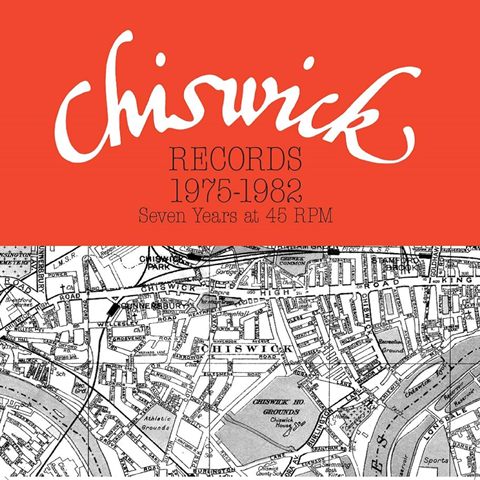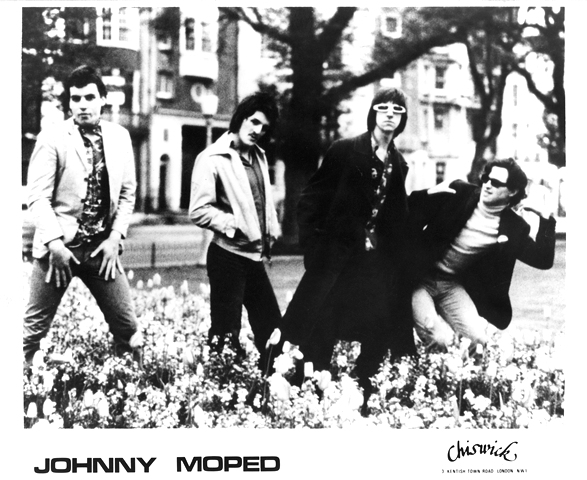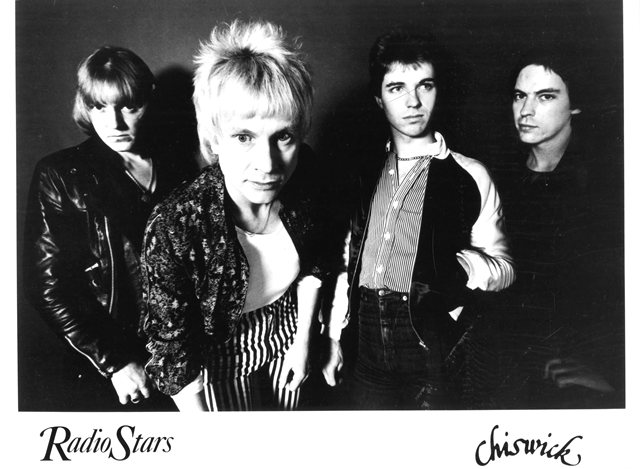Music Reissues Weekly: Chiswick Records 1975-1982 - Seven Years at 45 RPM | reviews, news & interviews
Music Reissues Weekly: Chiswick Records 1975-1982 - Seven Years at 45 RPM
Music Reissues Weekly: Chiswick Records 1975-1982 - Seven Years at 45 RPM
Triple-album 50th-anniversary celebration of the mould-breaking British independent label

Chiswick Records 1975-1982 - Seven Years at 45 RPM is a triple album marking the 50th anniversary of the first release on the titular label. That record was a four-track, seven-inch EP by the rough, Rolling Stones-ish pub rockers The Count Bishops. It came out in November 1975.
Setting the trend for what was around the corner with punk, not only was The Count Bishops EP on an independent label it also came in a picture sleeve. The label was an outgrowth of the Rock On record stall and shop. The folks behind the imprint – Roger Armstrong, Ted Carroll and Trevor Churchill – all had backgrounds in various aspects of the music business: backroom, mainstream and under the radar. Crucially, they knew what people were buying. What was hot, what was collectable and what was emerging from the undergrowth.
 Their customers included Malcolm McLaren and Joe Strummer. The latter’s pre-Clash band, The 101’ers, issued their only single on Chiswick just as Strummer was absconding to the nascent and shinier Clash. Another person haunting the Rock On outlets was Jesse Hector. His trio The Gorillas also ended up on Chiswick in 1976. As did, following brushes with other labels – including Stiff, which in 1976 followed Chiswick's lead – Lemmy’s Motörhead. He was another regular record browser.
Their customers included Malcolm McLaren and Joe Strummer. The latter’s pre-Clash band, The 101’ers, issued their only single on Chiswick just as Strummer was absconding to the nascent and shinier Clash. Another person haunting the Rock On outlets was Jesse Hector. His trio The Gorillas also ended up on Chiswick in 1976. As did, following brushes with other labels – including Stiff, which in 1976 followed Chiswick's lead – Lemmy’s Motörhead. He was another regular record browser.
Right place, right time then? Yes, but Chiswick – initially conceived as a reissue label – had limited grapples with what could really be dubbed “punk.” There were The Radiators From Space, Skrewdriver (not on the comp due to what they became soon after their time with Chiswick) and Johnny and the Self Abusers who, in a move akin to that of Strummer with the 101’ers and The Clash, changed their name to The Simple Minds just as their sole single under the punkish name was released. It came out as by Johnny etc. Then there was Johnny Moped, a misfit outfit lumped in with punk. But, as Armstrong says in his parts of the commentary on the inner sleeves (there is also text by Ted Carroll), they were akin to outsider art.
Chiswick excelled by picking up oddities which could click. Consider The Gorillas, who had the thump of glam rock and vim of punk but were more like Small Faces than anything else trying to break through in 1975 or 1976. Still, that didn’t stop them playing the world’s first punk rock festival in Mont-de-Marsan in France in August 1976.
 This follow-the-nose tendency is exemplified by Sniff ‘n’ the Tears, whose October 1978 single “Driver’s Seat” barely made any waves when it first hit shops. Record Mirror reviewed it by saying it was “breaking into the safety zone of Radio 1 playlist territory.” In Melody Maker, guest reviewer Paul Weller said “nice acoustic guitar opening. Unfortunately, after about 45 seconds it becomes monotonous.” In summer 1979, once licensed to Atlantic, the single reached number 15 the mainstream US Top 40. Around this point, “Driver’s Seat” had finally broken through into the UK Top 50.
This follow-the-nose tendency is exemplified by Sniff ‘n’ the Tears, whose October 1978 single “Driver’s Seat” barely made any waves when it first hit shops. Record Mirror reviewed it by saying it was “breaking into the safety zone of Radio 1 playlist territory.” In Melody Maker, guest reviewer Paul Weller said “nice acoustic guitar opening. Unfortunately, after about 45 seconds it becomes monotonous.” In summer 1979, once licensed to Atlantic, the single reached number 15 the mainstream US Top 40. Around this point, “Driver’s Seat” had finally broken through into the UK Top 50.
Being on board with things which weren’t obvious contenders was a recurrent theme. When Chiswick picked up The Dammed in 1979, it was a reformed/reconfigured version of the band which had broken through with punk in 1976. No one else was interested in them. Yet there they were, demonstrating an afterlife by charting and playing Top Of The Pops with their debut Chiswick single “Love Song.”
Back in 1976, Chiswick had tried to get The Dammed but Stiff had moved faster. It was the same in 1977 with The Adverts. Nonetheless, their frontman T.V. Smith, with his post-Adverts band The Explorers, turned up on Chiswick in 1980 with “Tomahawk Cruise.” Another band Chiswick were close to securing a deal with in 1976 were The Jam. Ultimately, they went with Polydor.
 Such encounters with what was on trend were not central to Chiswick. Which helps make this important label – in time, it became the still-thriving Ace Records – more fascinating than an imprint cleaving to one style or scene. There are bands, like The 101’ers and Johnny and the Self Abusers, which housed future household names: such as Riff Raff (Billy Bragg) or The Drug Addix (Kirsty MacColl: for reasons unknown they are not on Chiswick Records 1975-1982).
Such encounters with what was on trend were not central to Chiswick. Which helps make this important label – in time, it became the still-thriving Ace Records – more fascinating than an imprint cleaving to one style or scene. There are bands, like The 101’ers and Johnny and the Self Abusers, which housed future household names: such as Riff Raff (Billy Bragg) or The Drug Addix (Kirsty MacColl: for reasons unknown they are not on Chiswick Records 1975-1982).
Then, there are records by folks who had been around the block but were still vital: such as Radio Stars (with Andy Ellison, who had been in John’s Children with Marc Bolan, and Martin Gordon, formerly a member of Sparks) or The Rings (with Twink: his CV went back into early Seventies freakiness, Sixties psychedelia and more). There are also the barely knowns: the cajun-tinged 1977 hopefuls The Amazorblades with the melodic “Common Truth.” Most of all though, it’s the hot music which grabs the ear and emotions. Take Whirlwind’s “Hang Loose (I’ve Gotta Rock),” timelessly kinetic 1978 rockabilly which still thrills.
Dig into this exciting triple album. The narrative presented might be relatively unsung, but it is as important to the understanding of the UK in the punk and post-punk eras as stories which are typically and repeatedly shouted with much more volume. But move fast – Chiswick Records 1975-1982 - Seven Years at 45 RPM has a run limited to 500 copies.
- Next week: Robyn - 20th-anniversary double-LP reissue of the Swedish pop wonder’s eponymous international breakthrough album
- More reissue reviews on theartsdesk
- Kieron Tyler’s website
Share this article
The future of Arts Journalism
You can stop theartsdesk.com closing!
We urgently need financing to survive. Our fundraising drive has thus far raised £49,000 but we need to reach £100,000 or we will be forced to close. Please contribute here: https://gofund.me/c3f6033d
And if you can forward this information to anyone who might assist, we’d be grateful.

Subscribe to theartsdesk.com
Thank you for continuing to read our work on theartsdesk.com. For unlimited access to every article in its entirety, including our archive of more than 15,000 pieces, we're asking for £5 per month or £40 per year. We feel it's a very good deal, and hope you do too.
To take a subscription now simply click here.
And if you're looking for that extra gift for a friend or family member, why not treat them to a theartsdesk.com gift subscription?
more New music
 Music Reissues Weekly: Chiswick Records 1975-1982 - Seven Years at 45 RPM
Triple-album 50th-anniversary celebration of the mould-breaking British independent label
Music Reissues Weekly: Chiswick Records 1975-1982 - Seven Years at 45 RPM
Triple-album 50th-anniversary celebration of the mould-breaking British independent label
 Album: Josh Ritter - I Believe in You, My Honeydew
The alt-country singer's latest isn't consistent but does hit highs
Album: Josh Ritter - I Believe in You, My Honeydew
The alt-country singer's latest isn't consistent but does hit highs
 Album: David Byrne - Who is the Sky?
Born to be weird
Album: David Byrne - Who is the Sky?
Born to be weird
 Edinburgh Psych Fest 2025 review - eclectic and experimental
Underground gems and established acts in this multi-genre, multi-venue day long festival
Edinburgh Psych Fest 2025 review - eclectic and experimental
Underground gems and established acts in this multi-genre, multi-venue day long festival
 Album: Faithless - Champion Sound
Three decades into their career the perennial dance duo nail a lengthy but likeable set
Album: Faithless - Champion Sound
Three decades into their career the perennial dance duo nail a lengthy but likeable set
 Album: Saint Etienne - International
British pop institution’s final communiqué is an unalloyed winner
Album: Saint Etienne - International
British pop institution’s final communiqué is an unalloyed winner
 Album: Brad Mehldau - Ride into the Sun
A sincere tribute to Elliott Smith
Album: Brad Mehldau - Ride into the Sun
A sincere tribute to Elliott Smith
 Music Reissues Weekly: The Outer Limits - Just One More Chance
Exhaustive anthology unearths the full story of the Sixties mod-pop band from Leeds
Music Reissues Weekly: The Outer Limits - Just One More Chance
Exhaustive anthology unearths the full story of the Sixties mod-pop band from Leeds
 theartsdesk Radio Show 37 - Pete Lawrence of the Big Chill discusses the power of protest music and his new project This Is The Fire
Talking to cultural activist Pete Lawrence – camp outs, singalongs and saving the world
theartsdesk Radio Show 37 - Pete Lawrence of the Big Chill discusses the power of protest music and his new project This Is The Fire
Talking to cultural activist Pete Lawrence – camp outs, singalongs and saving the world
 Album: Sabrina Carpenter - Man's Best Friend
Short but not so sweet
Album: Sabrina Carpenter - Man's Best Friend
Short but not so sweet

Add comment